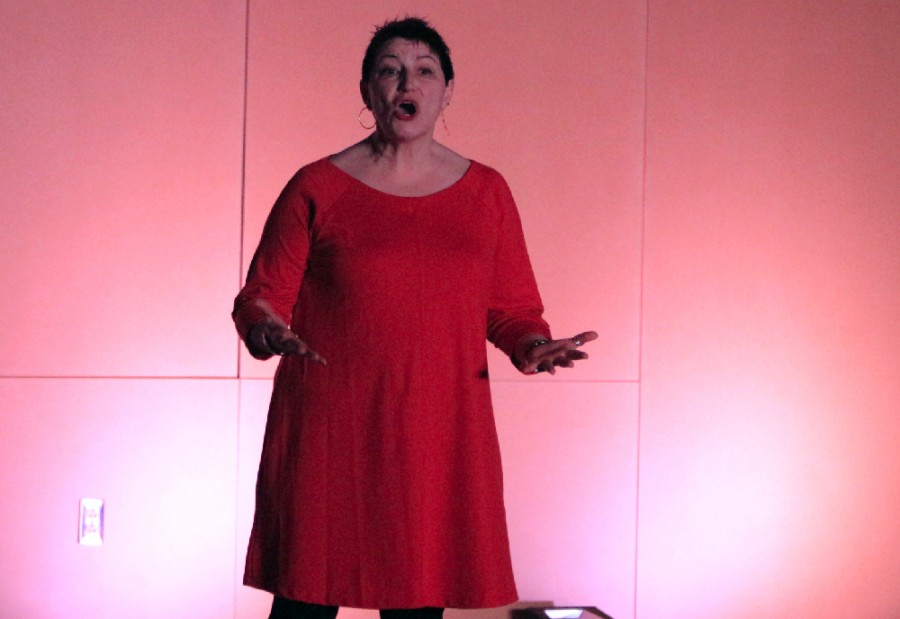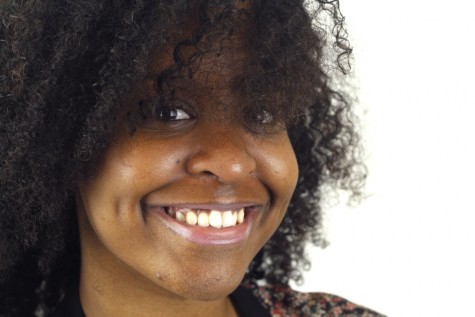Vagina Monologues bring awareness, empowerment
February 28, 2016
A red haze filled the silhouette of Angie Hunt as she fervently recited the monologue “My Angry Vagina.”
An array of topics were thoroughly discussed during this year’s The Vagina Monologues. These topics ranged from orgasms, sexual openness, rape, childbirth and love for the female anatomy.
Hunt, a housing program director for HOPE, partook in the weekend full of monologues. Fragments of the monologue like “They shove us up, clean us up and make us go away,” and ”Well my vagina is not going away, it’s pissed off and it’s staying right here,”
Hunt described the things women do to smell “pleasant” or to look more presentable “down there.”
Hoots, laughter and even some whistles followed Hunt as she exited stage. Participants of the weekend portrayed different survivors of rape, self-hate and manipulation by reciting their stories.
Hunt said that monologue in particular shines light on how society views the female body. She said sitting and pondering about violence against women makes her angry, and she channels that anger whenever she performs the piece.
“It’s to channel that desperate wish that in time, we can end this,” Hunt said.
The 2 p.m. section of the monologues took a more serious tone when Sydney Rohmann, a senior psychology major, recited “My Vagina Was My Village.”
The monologue told a story of a Bosnian woman refugee whom men in a war camp in Yugoslavia raped. Rohmann recited one woman’s story of surviving the use of rape as a systematic tactic of war.
“My vagina was clean water, soft pink fields,” Rohmann said. “There is something between my legs, I do not know what it is.”
Rohmann’s soft yet tortured voice silenced the crowd as she descriptively shared the woman’s story.
“Six of them, monstrous doctors, black masks shoving bottles up me, there was sticks and a end of a broom,” Rohmann said. “They left their dirty sperm inside me and I became a river of poison and all the crops died.”
Following the show, Rohmann said the monologues incorporated both light-hearted pieces and serious ones for awareness.
“You can’t have one dynamic for a whole show,” Rohmann said. “You have serious pieces because they have to be focused on and addressed.”
One monologue took audience members on an emotional rollercoaster as topics switched from humorous to heartwrenching.
The coordinator of Women’s Studies, Jeannie Ludlow, performed a revolutionary piece for the audience. Ludlow said the monologues bring an amplified sense of awareness and empathy for the experiences of people who are victimized by gendered violence.
“As a whole, the show does a great job of balancing the awful with the possibility for change,” Ludlow said. “In that way, it leaves us with both increased awareness of the realities of people’s lives and a feeling that we can help make things better.”
Before the show began, a word of warning was given for those who may have felt uncomfortable during the show.
Ky Newsome, a legal advocate for HOPE, recited the theatrical emotion-spinning piece, “The Little Coochi Snorcher That Could.” This piece followed a woman who was on the road of finding herself through her childhood up until her late teens.
With each recollection, Newsome introduced the scene by saying “memory.” The woman in the monologue discussed rape at a young age, to finding herself attracted to women.
“I realize later that she was my surprise, unexpected, politically incorrect salvation,” Newsome said.
The Vagina Monologues bring a sense of awareness on the topic of inequality Newsome said.
The director of the Vagina Monologues, Dana Gilbertsen, said the monologues bring a sense of empowerment to women. She said the weekend surrounds a topic that is often seen as taboo.
“These things do happen and these are problems, that we need to work on as a society,” Gilbertsen said.
One of the Monologues, “The One Who Loved to Make Vaginas Happy,” included the women of the night acting out the many moans done by women. The diverse moans had the crowd roaring with laughter.
About 13 monologues were recited at the different sessions during the weekend. The performers ranged from student, faculty and staff, and community members from both Charleston and Mattoon.
The proceeds from the weekend will be divided between HOPE of East Central Illinois and the Sexual Assault Counseling and Information Service, two non-profit organizations that advocate for victims of sexual assault.
T’Nerra Butler can be reached at 581-2812 or tabutler@eiu.edu



















![[Thumbnail Edition] Senior Foward Macy McGlone, getsw the ball and gets the point during the first half of the game aginst Western Illinois University,, Eastern Illinois University Lost to Western Illinois University Thursday March 6 20205, 78-75 EIU lost making it the end of their season](https://www.dailyeasternnews.com/wp-content/uploads/2025/03/WBB_OVC_03_O-1-e1743361637111-1200x614.jpg)


















































